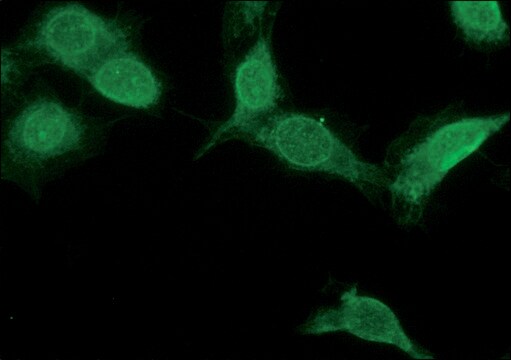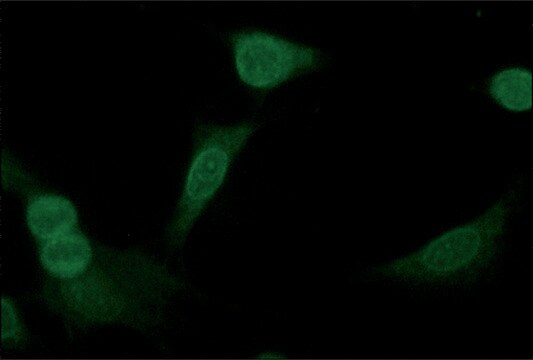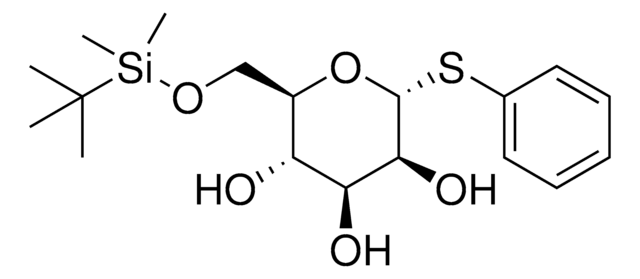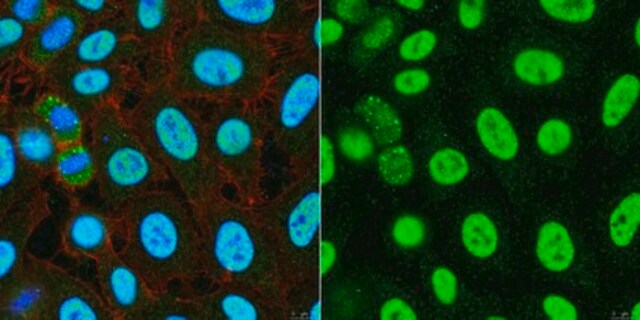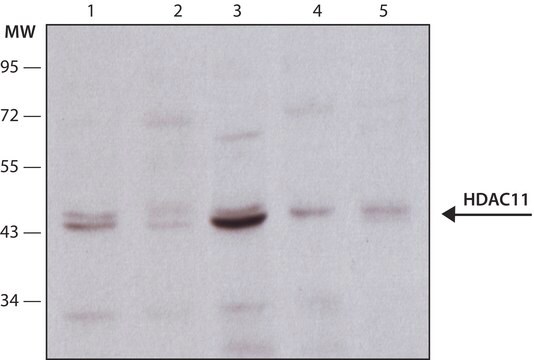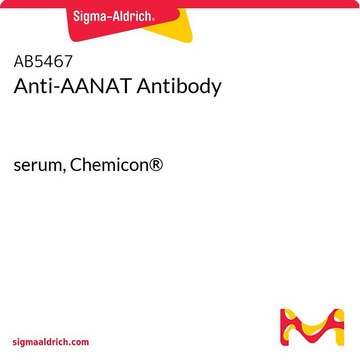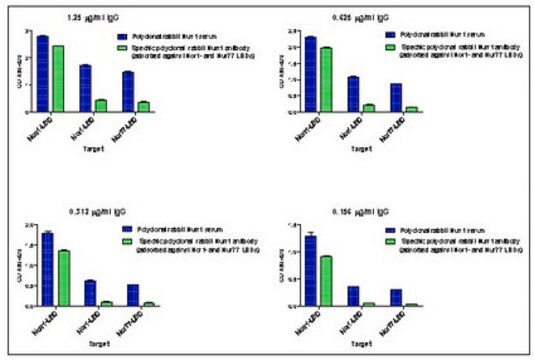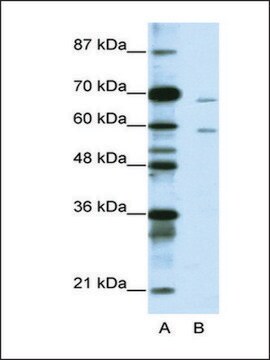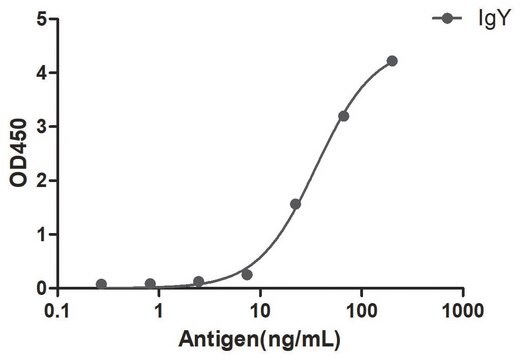AB5778
Anti-Nurr1 / NOT1 Antibody
Chemicon®, from rabbit
別名:
Anti-HZF-3, Anti-NOT, Anti-NURR1, Anti-RNR1, Anti-TINUR
ログイン組織・契約価格を表示する
すべての画像(1)
About This Item
UNSPSCコード:
12352203
eCl@ss:
32160702
NACRES:
NA.41
クローン:
polyclonal
application:
IHC
WB
WB
化学種の反応性:
mouse, human
テクニック:
immunohistochemistry: suitable
western blot: suitable
western blot: suitable
citations:
6
おすすめの製品
由来生物
rabbit
品質水準
抗体製品の状態
affinity purified immunoglobulin
抗体製品タイプ
primary antibodies
クローン
polyclonal
精製方法
affinity chromatography
化学種の反応性
mouse, human
メーカー/製品名
Chemicon®
テクニック
immunohistochemistry: suitable
western blot: suitable
NCBIアクセッション番号
UniProtアクセッション番号
輸送温度
dry ice
ターゲットの翻訳後修飾
unmodified
遺伝子情報
human ... NR4A2(4929)
特異性
Recognizes Nurr1 / NOT1 (Cys4 zinc finger of nuclear receptor type family), a zinc finger transcription factor.
免疫原
Synthetic peptide.
アプリケーション
Research Category
ニューロサイエンス
ニューロサイエンス
Research Sub Category
ニューロン発生
神経変性疾患
ニューロン発生
神経変性疾患
Detect Nurr1 / NOT1 using this Anti-Nurr1 / NOT1 Antibody validated for use in WB, IH.
Western blot: 1:200-1:1,000 using ECL.
Immunohistochemistry: 1:200-1:1,000.
Optimal working dilutions must be determined by the end user.
Immunohistochemistry: 1:200-1:1,000.
Optimal working dilutions must be determined by the end user.
物理的形状
Affinity purified immunoglobulin. Precipitated antibody in a solution of 50% saturated ammonium sulfate and PBS containing no preservatives.
保管および安定性
Maintain unopened vial at -70°C for up to 6 months. Avoid repeated freeze/thaw cycles.
PREPARATION AND USE:
To reconstitute the antibody, centrifuge the antibody vial at moderate speed (5,000 rpm) for 5 minutes to pellet the precipitated antibody product. Carefully remove the ammonium sulfate/PBS buffer solution and discard. It is not necessary to remove all of the ammonium sulfate/PBS solution: 10 μL of residual ammonium sulfate solution will not affect the resuspension of the antibody. Do not let the protein pellet dry, as severe loss of antibody reactivity can occur.
Resuspend the antibody pellet in a suitable biological buffer such as PBS or TBS (pH 7.3-7.5) to a final concentration of 1.0 mg/mL. For example, to achieve a 1.0 mg/mL concentration with 50 μg of precipitated antibody, the amount of buffer needed would be 50 μL.
Carefully add the liquid buffer to the pellet. DO NOT VORTEX. Mix by gentle stirring with a wide pipet tip or gentle finger-tapping. Let the precipitated antibody rehydrate for 1 hour at 4-25°C prior to use. Small particles of precipitated antibody that fail to resuspend are normal. Vials are overfilled to compensate for any losses.
The rehydrated antibody solutions can be stored undiluted at 2-8°C for 2 months without any significant loss of activity. Note, the solution is not sterile, thus care should be taken if product is stored at 2-8°C.
For storage at -20°C, the addition of an equal volume of glycerol can be used, however, it is recommended that ACS grade or higher glycerol be used, as significant loss of activity can occur if the glycerol used is not of high quality.
For long-term storage at -70°C, it is recommended that the rehydrated antibody solution be further diluted 1:1 with a 2% BSA (fraction V, highest-grade available) solution made with the rehydration buffer. The resulting 1% BSA/antibody solution can be aliquoted and stored frozen at -70°C for up to 6 months. Avoid repeated freeze/thaw cycles.
PREPARATION AND USE:
To reconstitute the antibody, centrifuge the antibody vial at moderate speed (5,000 rpm) for 5 minutes to pellet the precipitated antibody product. Carefully remove the ammonium sulfate/PBS buffer solution and discard. It is not necessary to remove all of the ammonium sulfate/PBS solution: 10 μL of residual ammonium sulfate solution will not affect the resuspension of the antibody. Do not let the protein pellet dry, as severe loss of antibody reactivity can occur.
Resuspend the antibody pellet in a suitable biological buffer such as PBS or TBS (pH 7.3-7.5) to a final concentration of 1.0 mg/mL. For example, to achieve a 1.0 mg/mL concentration with 50 μg of precipitated antibody, the amount of buffer needed would be 50 μL.
Carefully add the liquid buffer to the pellet. DO NOT VORTEX. Mix by gentle stirring with a wide pipet tip or gentle finger-tapping. Let the precipitated antibody rehydrate for 1 hour at 4-25°C prior to use. Small particles of precipitated antibody that fail to resuspend are normal. Vials are overfilled to compensate for any losses.
The rehydrated antibody solutions can be stored undiluted at 2-8°C for 2 months without any significant loss of activity. Note, the solution is not sterile, thus care should be taken if product is stored at 2-8°C.
For storage at -20°C, the addition of an equal volume of glycerol can be used, however, it is recommended that ACS grade or higher glycerol be used, as significant loss of activity can occur if the glycerol used is not of high quality.
For long-term storage at -70°C, it is recommended that the rehydrated antibody solution be further diluted 1:1 with a 2% BSA (fraction V, highest-grade available) solution made with the rehydration buffer. The resulting 1% BSA/antibody solution can be aliquoted and stored frozen at -70°C for up to 6 months. Avoid repeated freeze/thaw cycles.
法的情報
CHEMICON is a registered trademark of Merck KGaA, Darmstadt, Germany
免責事項
Unless otherwise stated in our catalog or other company documentation accompanying the product(s), our products are intended for research use only and are not to be used for any other purpose, which includes but is not limited to, unauthorized commercial uses, in vitro diagnostic uses, ex vivo or in vivo therapeutic uses or any type of consumption or application to humans or animals.
適切な製品が見つかりませんか。
製品選択ツール.をお試しください
保管分類コード
12 - Non Combustible Liquids
WGK
WGK 2
引火点(°F)
Not applicable
引火点(℃)
Not applicable
適用法令
試験研究用途を考慮した関連法令を主に挙げております。化学物質以外については、一部の情報のみ提供しています。 製品を安全かつ合法的に使用することは、使用者の義務です。最新情報により修正される場合があります。WEBの反映には時間を要することがあるため、適宜SDSをご参照ください。
Jan Code
AB5778:
試験成績書(COA)
製品のロット番号・バッチ番号を入力して、試験成績書(COA) を検索できます。ロット番号・バッチ番号は、製品ラベルに「Lot」または「Batch」に続いて記載されています。
In vitro generation of dopaminergic neurons from adult subventricular zone neural progenitor cells.
Theodora Papanikolaou,Jessica B Lennington,Adrienne Betz,Cristina Figueiredo et al.
Stem Cells and Development null
Yaping Chu et al.
The Journal of comparative neurology, 494(3), 495-514 (2005-12-02)
In mammals, the transcription factor Nurr1 is expressed early in development and continues to be detectable throughout the organism's lifetime. Nurr1 is involved in the establishment and maintenance of the dopaminergic phenotype within specific central nervous system neuronal subpopulations including
Chang-Hwan Park et al.
Journal of cell science, 119(Pt 11), 2310-2320 (2006-05-26)
The steroid receptor-type transcription factor Nurr1 has a crucial role in the development of the mesencephalic dopamine (DA) neurons. Although ectopic expression of Nurr1 in cultured neural precursor cells is sufficient in establishing the DA phenotype, Nurr1-induced DA cells are
Dopaminergic-like neurons derived from oral mucosa stem cells by developmental cues improve symptoms in the hemi-parkinsonian rat model.
Ganz, J; Arie, I; Buch, S; Zur, TB; Barhum, Y; Pour, S; Araidy, S; Pitaru, S; Offen, D
Testing null
ライフサイエンス、有機合成、材料科学、クロマトグラフィー、分析など、あらゆる分野の研究に経験のあるメンバーがおります。.
製品に関するお問い合わせはこちら(テクニカルサービス)